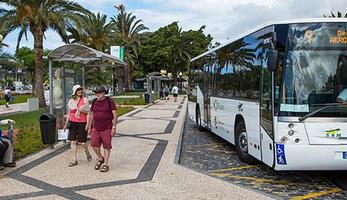Mobility planning for tourism related companies
Summary
The main goal of this measure was to promote sustainable mobility among tour operators and final consumers by providing tourist operators with the necessary tools and incentives to become ambassadors for sustainable mobility.
To achieve this, a comprehensive strategy was implemented and comprised four main actions: study the mobility of tourists; stakeholder engagement; training and more information activities; and communication campaigns.
Implementing sustainable mobility
Study the mobility of tourists
Having in-depth knowledge of tourists’ needs, preferences and mobility pattern was essential to define the mobility strategy and to adapt the mobility offer. Hence, annually, tourism and mobility surveys were given to the tourists at the main gateways of the island (port and airport) to understand the transport modes and technologies used, to gague tourists’ satisfaction with the mobility system, and to gather suggestions. As a result, the local partners identified improvement needs related with the communication strategy, the quality of the information available at bus stops, and the information provided by the staff.
Stakeholder engagement
The engagement of stakeholders was decisive in the successful development of this measure. Meetings with stakeholders and citizens from the tourism and mobility sectors were a great opportunity for stakeholders to assess problems, and more importantly, to be part of the solutions.
Training and information activities
The local partners understood that if the hotel staff had the correct information, materials and were motivated, there would be a greater chance that they would suggest PT to tourists. Therefore, HF’s commercial team reinforced the follow-up activities with hotel staff, providing all the required information and materials about PT, clarifying doubts, and collecting improvement proposals.
To promote interaction with the tourists and improve customer service, HF provided specific training in English on first-aid, customer service and care, and complaints management.
HF also produced dedicated communication material, namely: marketing posters, specific brochures, bus guides and PT foldout maps. Due to the COVID-19 situation, dedicated flyers were produced and delivered to hotels that promoted the safe use of PT.
Promotional campaigns aimed at sustainable transport modes
The Regional Government of Madeira developed a communication campaign to promote the use of more sustainable transport modes among tourists.
The message transmitted was to preserve nature, which is one of the main attractions in Madeira. For this action, postcards and an animation video were produced showing the advantages of using more sustainable transport modes. The video was shown on outdoor screens in the city centre.
More information
- Measure evaluation report (preliminary version)
- Bus Guide on the Visit Madeira website - see PDF
Outcomes
- Increased knowledge about PT - 102 tourism professionals received training
- Increased knowledge of English - 88 PT drivers and administrative staff received training
- Improved English skills amongst PT drivers - 11% improvement in speaking ability; 18% in understanding
- Tourists aware about travel options – 29% aware of sustainable transport possibilities
- Tourists more satisfied with the PT staff – Increased satisfaction of 8% with politeness and 10% with the ease of communication
- More tourists using the Tourist Kit – An average of more 5% daily tickets sold







